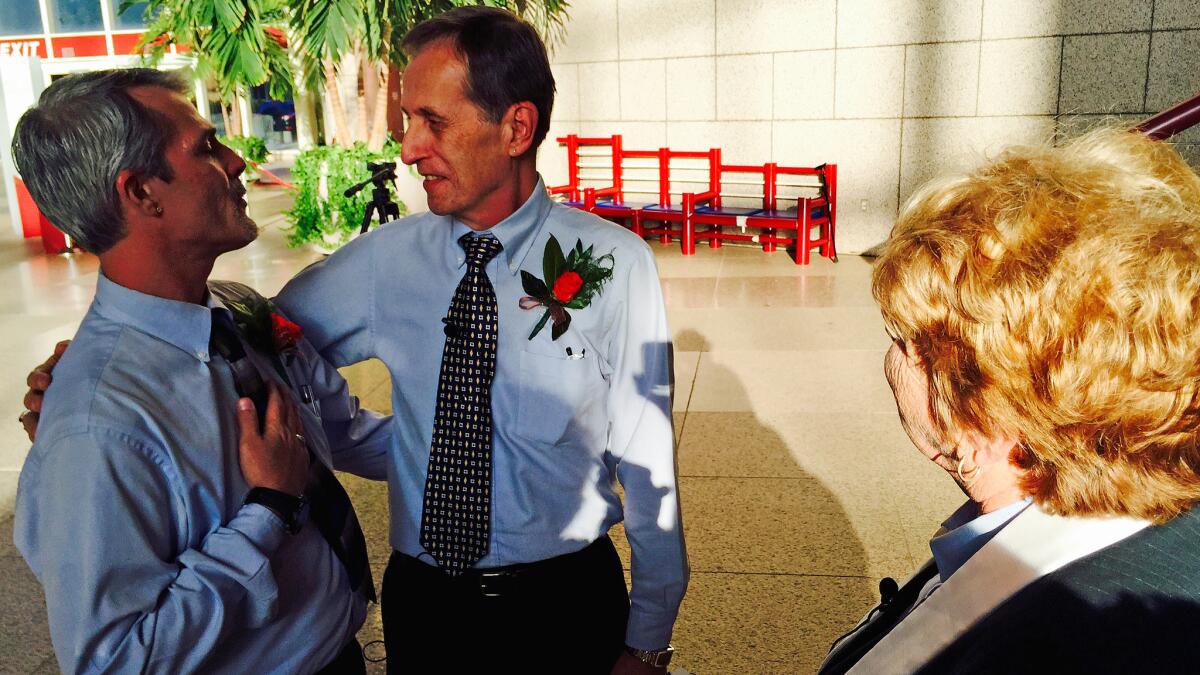Federal judge orders Alabama to issue marriage licenses to same-sex couples

Reporting from Mobile, Ala. â Moments after a federal judge ruled Thursday that gay marriage licenses must be issued, Robert Povilat and his husband-to-be, Milton Persinger, were proudly the first in line at the Mobile County Probate Court and started filling out their paperwork.
âI am overjoyed. We are no longer second-class citizens,â Povilat said.
âI am speechless. Iâve never been happier in my life,â Persinger added.
âBy the power vested in me by the church â and the state â I pronounce you married,â said the Rev. Sandy OâSteen, a minister with Cornerstone Metropolitan Community Church who performed the nuptials for the first same-sex couple to marry in this Deep South port city.
Alabama has been in a confused state on matrimony all week as state Supreme Court Chief Justice Roy Moore ordered probate judges to ignore the federal courts that had ruled in favor of gay marriage. The U.S. Supreme Court, in a 7-2 ruling Monday, refused to grant a stay that would have temporarily blocked same-sex marriages.
Most of the probate judges, who issue marriage licenses, found themselves torn between the federal ruling and the stateâs top judge, who has sparred before with the federal court system and who personally opposes gay marriage â as does a sizable majority of the state, according to polls.
Estimates vary, but judges in about 45 of the stateâs 67 counties refused to issue licenses for same-sex marriages, while more than 20 judges complied with the federal courts.
After listening to about 30 minutes of arguments from each side, U.S. District Judge Callie Granade called a recess and then quickly issued her ruling in support of four same-sex couples seeking action against Mobile Probate Judge Don Davis, who had refused to issue them marriage licenses.
âThis injunction binds Judge Don Davis and all his officers, agents, servants and employees, and others in active concert or participation with any of them, who would seek to enforce the marriage laws of Alabama which prohibit or fail to recognize same-sex marriage,â the judge wrote.
Heather Fann, a Birmingham-based attorney for several of the couples, said she hoped Thursdayâs ruling would make it clear to judges elsewhere in the state that they should also start issuing the licenses.
âWe hope and expect that the remaining probate judges across the state of Alabama will understand the import of this decision,â she said.
During the hearing, Michael Druhan, the lead attorney representing Davis, said the probate judge only wanted a clear direction. The lawyer compared Davis to a soldier in a Vietnamese rice paddy who has stepped on a land mine.
âIf he stands there, a sniper is going to shoot him in the head, and if he moves, the mine is going to blow him to pieces,â Druhan said.
Davis âsays he wants âguidance from the courtââ about how exactly to issue marriage licenses to same-sex couples, said Randall Marshall, lead attorney for the American Civil Liberties Union, representing several gay couples. He added that both sides wanted the same thing: guidance.
Last month, Granade overturned the stateâs ban on same-sex nuptials as violating the U.S. Constitution but stayed her ruling until Monday to give the state time to prepare. The U.S. Supreme Court is scheduled to deal with the issue of same-sex marriage this term.
Moore, the chief justice, said Thursday he would continue to resist efforts to implement same-sex marriage in his state, even if the U.S. Supreme Court, as expected, rules in favor of gay marriage.
âYou can dissent to the United States Supreme Court,â Moore said in a testy interview with CNNâs Chris Cuomo on âNew Day.â
âI will follow the law as I interpret it,â he said.
Moore argues that the federal courts cannot overturn the popular will expressed in a 2006 ballot vote in Alabama to limit marriage to a man and woman. The state constitutional amendment passed with 81% of the vote.
Moore characterized the federal judgeâs ruling that overturned the stateâs ban as an âattempt by the federal court to control the state,â which he called a âfederal intrusion into state sovereignty.â
Both arguments have been rejected by the federal courts in the past. For example, many parts of the South unsuccessfully argued that statesâ rights should trump federal civil rights actions during the 1960s. Statesâ rights were also a principal point of contention leading to the Civil War.
Moore has made a career of challenging federal court mandates.
He came to prominence as an Etowah County judge in the 1990s when he refused to remove an 18-by-24-inch plaque of the Ten Commandments from his courtroom wall.
After riding conservative support to win a seat on the state Supreme Court, he had a 4-foot-tall, nearly 3-ton monument to the Ten Commandments installed in the high courtâs rotunda in the middle of the night.
matthew.teague @latimes.com
michael.muskal @latimes.com
Twitter: @MatthewTeague
@latimesmuskal
Teague reported from Mobile and Muskal from Los Angeles.
More to Read
Sign up for Essential California
The most important California stories and recommendations in your inbox every morning.
You may occasionally receive promotional content from the Los Angeles Times.











